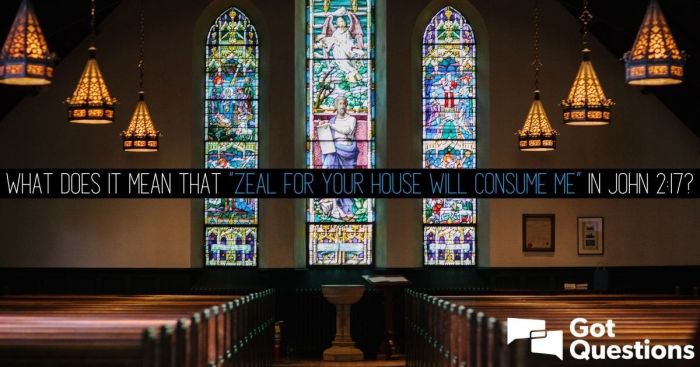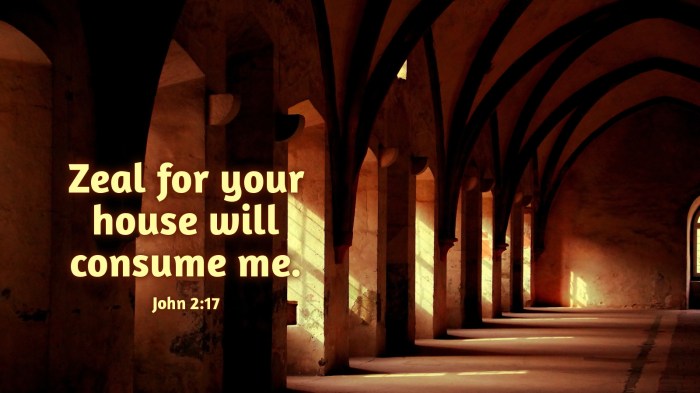Zeal for your house will consume me meaning – Zeal for your house will consume me, a phrase reverberating with fervor and devotion, invites us on an introspective journey. Rooted in biblical narratives, it has sparked countless interpretations, artistic expressions, and personal reflections. This exploration delves into the multifaceted meanings and implications of this evocative statement.
From its origins in the biblical context to its historical significance and contemporary relevance, we will uncover the essence of zeal and its profound impact on our understanding of faith, worship, and service.
Biblical Context

The phrase “zeal for your house will consume me” originates in the biblical narrative of Psalm 69:9, uttered by King David. This psalm is a lament expressing David’s distress and persecution, and his plea for God’s deliverance.
In the specific context of Psalm 69, David’s zeal refers to his intense devotion and commitment to the Temple and the worship of God. He is consumed by a passionate desire to see the Temple honored and protected, and his heart is filled with anguish when he witnesses the mistreatment of God’s sanctuary and its people.
David’s zeal is not merely an emotional outburst but a reflection of his deep understanding of the importance of God’s presence among his people. The Temple is the dwelling place of God, and its defilement or destruction is an affront to his holiness and majesty.
Historical Interpretations

Throughout history, the phrase “zeal for your house will consume me” has been interpreted in various ways, reflecting the evolving understanding of faith and devotion within different religious traditions.
- Early Christian Interpretations:In the early Church, the phrase was seen as a prophecy of Jesus’ zeal for the Temple, which led him to cleanse it from the money changers and merchants (Matthew 21:12-13). This interpretation emphasized the importance of zeal in defending the purity of God’s house and worship.
- Medieval Interpretations:During the Middle Ages, the phrase was often associated with the Crusades, as Christian knights sought to liberate the Holy Land from Muslim control. Zeal for God’s house was seen as a justification for holy war and the defense of the Christian faith.
- Reformation Interpretations:Protestant reformers such as Martin Luther emphasized the phrase’s connection to personal piety and devotion. They argued that zeal for God’s house should be expressed through the study of Scripture, prayer, and a life of obedience to God’s commands.
Literary and Artistic Expressions: Zeal For Your House Will Consume Me Meaning

The theme of “zeal for your house will consume me” has found expression in numerous literary and artistic works throughout history:
- Dante’s Inferno:In his epic poem, Dante depicts the zeal of the blessed in heaven, who are consumed by their love for God and the desire to serve him.
- John Milton’s Paradise Lost:Milton’s epic poem explores the theme of zeal through the character of Satan, whose excessive zeal for his own glory leads to his downfall.
- William Blake’s “The Tyger”:Blake’s poem uses the metaphor of a tiger to symbolize the fierce and passionate nature of zeal, which can be both destructive and awe-inspiring.
Popular Questions
What is the origin of the phrase “zeal for your house will consume me”?
The phrase originates from Psalm 69:9, where the psalmist expresses his intense devotion to God and his temple.
How has the phrase been interpreted throughout history?
The phrase has been interpreted as a call to fervent worship, a warning against excessive zeal, and a reflection on the transformative power of devotion.
What are some examples of literary or artistic expressions that explore the theme of “zeal for your house will consume me”?
Examples include the works of poets such as William Blake and Emily Dickinson, as well as paintings by El Greco and Caravaggio.
